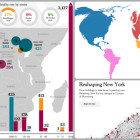data driven journalism
Top Ten #ddj: The Week’s Most Popular Data Journalism Links
|
What’s the data driven journalism (#ddj) crowd tweeting about? Here are the week’s Top Data Journalism Links on Twitter (for September 18-25), including items from BBC, The Guardian, and JeuneAfrique, among others.







